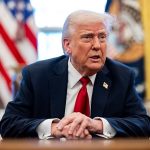In the whirlwind world of American politics, tensions are rising not just within the halls of power but also in the media that cover it. Recently, senior editor of Reason Magazine, Meghan Hayes, took to the airwaves to break down an ongoing drama involving Pete Hegseth, a prominent figure in the Trump administration and former Fox News personality. The conversation highlighted the heightened scrutiny that Hegseth faces from the media, which many view as a coordinated effort to undermine his role in the Pentagon.
The controversy ignited when it was reported that Hegseth allegedly shared information that, while not classified, raised eyebrows across the political landscape. This information reportedly included military actions being considered against certain threats, which led many to question the protocols of information sharing within the defense establishment. The media’s fixation on Hegseth seems to stem from a deeper ideological wedge, where his “outsider” status in D.C. becomes a target for critics. This has led to speculation that the press is not merely reporting facts but actively trying to “scalp” someone who doesn’t fit the traditional mold.
It’s interesting to note that the media’s focus often neglects the actions of others who may have been involved in more severe breaches of protocol. For instance, questions arose regarding the behavior of other officials who faced significant consequences for their actions, yet Hegseth remains in the spotlight. Some argue that this selective coverage is an indication of bias against Hegseth due to his association with the Trump administration and his relatively unconventional rise to the Pentagon. Hayes emphasized that while Hegseth might be an easy target, the real story lies in the emerging foreign policy debates that are shaping national security decisions.
Amid the chaos, it appears that various factions within the government are battling for influence and control over policy decisions, particularly regarding America’s relationship with adversaries like Iran. The challenges Hegseth faces are emblematic of the broader struggles within the administration, as traditional norms are tested against the Trump-era desire for more straightforward, America-first policies. Hayes noted that the media’s portrayal of the Pentagon as chaotic and dysfunctional has directly contributed to a sense of unease among the American public.
As tensions within the Pentagon and the political realm continue to unfold, the question of how to manage sensitive information remains at the forefront. Hayes pointed out that frustrations arise among those who feel that systemic processes stifle innovation and change, an argument that resonates with many Trump supporters looking for substantial reforms. While the media may focus on sensational narratives, the real issues concerning military readiness and foreign policy direction are often left unaddressed.
Ultimately, the dynamics between the administration, the media, and the public are complex and fraught with uncertainty. As Pete Hegseth faces mounting pressure from both within the Pentagon and outside influences, the unfolding narrative serves as a reminder of the power of perception in politics. Whether the media will shift its focus to more pressing issues or continue to chase the latest scandal remains to be seen, but one thing is clear: battles are not just fought on the ground, but in the headlines as well.




